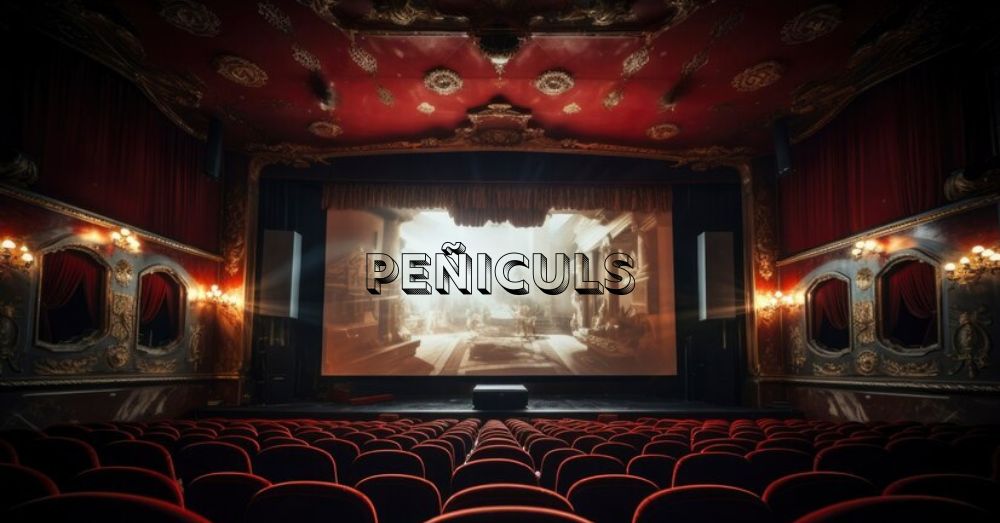Introduction
Cinema, a powerful medium for storytelling, has been an integral part of cultural expression across the globe. In Catalonia, the term “peñiculs” signifies more than just movies; it encapsulates a rich tradition of cinematic art that reflects the region’s unique cultural, historical, and linguistic identity. Catalonia, a vibrant and historically significant region in northeastern Spain, has a distinct cultural heritage that includes its own language, Catalan, which emerged between the eighth and tenth centuries. This article delves into the world of Peñiculs or Movies Catalan cinema, exploring its origins, evolution, notable contributions, and its role in shaping the cultural landscape of Catalonia.
Peñiculs Historical Context of Catalan Cinema
Early Beginnings
The birth of Peñiculs Catalan cinema can be traced back to the early 20th century. In the early days, the film industry in Catalonia was influenced by the broader European cinematic trends. The first Catalan film, “Riña en un café” (Fight in a Café), directed by Fructuós Gelabert in 1897, marked the beginning of an era. This silent short film, although simple in its narrative, was a pioneering effort that laid the foundation for future developments in the region’s film industry.
The Silent Era
The silent film era in Catalonia saw a surge in production and creativity. Filmmakers like Gelabert and Segundo de Chomón played crucial roles in this period. Chomón, often referred to as the “Spanish Méliès,” was renowned for his innovative special effects and creative storytelling. His works, such as “El hotel eléctrico” (The Electric Hotel) in 1908, showcased his talent and contributed significantly to the technical and artistic evolution of cinema Peñiculs or Movies.
Read Also: Galenmetzger1: Exploring the Journey of Excellence
The Influence of Avant-Garde Movements
During the 1920s and 1930s, Catalan cinema Peñiculs began to experiment with avant-garde movements. Filmmakers like Luis Buñuel and Salvador Dalí, though not exclusively Catalan, had a profound influence on the region’s cinematic landscape. Their collaboration on “Un Chien Andalou” (1929), a surrealist short film, left an indelible mark on Peñiculs filmmakers, encouraging them to explore unconventional narratives and visual styles.
The Spanish Civil War and Its Impact
The outbreak of the Spanish Civil War in 1936 had a devastating impact on the Catalan film industry Peñiculs. The conflict disrupted film production, and many filmmakers were forced into exile. The war and the subsequent Francoist dictatorship (1939-1975) imposed severe censorship on artistic expression, including cinema Peñiculs. During this period, Catalan language and culture were heavily repressed, and Catalan cinema faced significant challenges in terms of production and distribution.
Despite these challenges, filmmakers like Laya Films, a production company created by the Catalan government during the war, managed to produce newsreels and documentaries that captured the realities of the conflict. These efforts were crucial in preserving Catalan identity and resisting cultural oppression.
Revival and Growth in the Post-Franco Era
The Transition to Democracy
The death of Francisco Franco in 1975 and Spain’s subsequent transition to democracy marked a turning point for Catalan cinema Peñiculs. The new democratic government restored cultural freedoms, and the Catalan language experienced a renaissance. This period saw the re-emergence of Catalan cinema as filmmakers began to explore themes related to identity, history, and contemporary social issues.
The Rise of Peñiculs Catalan Filmmakers
During the 1980s and 1990s, a new generation of Catalan filmmakers emerged, bringing fresh perspectives and innovative storytelling techniques. Directors like Bigas Luna, Ventura Pons, and Isabel Coixet gained international recognition for their work. Bigas Luna’s “Jamón, Jamón” (1992) and Ventura Pons’s “Ocaña, retrat intermitent” (1978) are notable examples of films that garnered critical acclaim and highlighted Catalan culture and issues.
Isabel Coixet, one of the most prominent contemporary Catalan filmmakers, achieved international success with films like “My Life Without Me” (2003) and “The Secret Life of Words” (2005). Her films often explore themes of human relationships, existential questions, and social justice, reflecting a deep empathy and understanding of the human condition.
Peñiculs Catalan Cinema in the 21st Century
Technological Advancements and New Media
The 21st century has brought significant technological advancements that have transformed the film industry globally, and Catalan cinema is no exception. Digital filmmaking, online distribution platforms, and advancements in special effects have opened new avenues for Catalan filmmakers. These technologies have democratized filmmaking, allowing independent filmmakers to produce and distribute their work more easily.
Prominent Catalan Films and Filmmakers
In recent years, Peñiculs Catalan cinema has continued to thrive, producing films that resonate both locally and internationally. One of the most successful Catalan films in recent times is “Pa negre” (Black Bread) directed by Agustí Villaronga. Released in 2010, the film is set in post-Civil War rural Catalonia and explores themes of innocence, betrayal, and survival. “Pa negre” received critical acclaim and numerous awards, including nine Goya Awards, making it a milestone in Catalan cinema.
Another significant filmmaker is J.A. Bayona, whose work has gained international recognition. His film “The Orphanage” (2007), produced by Guillermo del Toro, was a critical and commercial success. Bayona’s ability to blend horror with emotional depth has earned him a place among the top contemporary filmmakers.
Festivals and Institutions Supporting Catalan Cinema
Catalan cinema has a robust support system through various film festivals and institutions. The Sitges Film Festival, one of the world’s foremost genre film festivals, showcases Catalan films alongside international works, providing a platform for filmmakers to reach a global audience. The Catalan Film Academy and the Institut Català de les Empreses Culturals (ICEC) are instrumental in promoting and supporting Catalan cinema through funding, training programs, and international collaborations.
Themes and Trends in Catalan Cinema
Exploration of Identity and Culture
One of the recurring themes in Catalan cinema is the exploration of identity and culture. Filmmakers often delve into the complexities of Catalan identity, reflecting on historical events, language, and cultural heritage. This theme is particularly evident in films that address the Spanish Civil War and its aftermath, as well as the Francoist repression. Films like “Pa negre” and “Incerta glòria” (Uncertain Glory) by Agustí Villaronga offer poignant insights into Catalan history and identity.
Social and Political Commentary
Catalan filmmakers have not shied away from addressing contemporary social and political issues. Films often tackle subjects such as immigration, gender equality, LGBTQ+ rights, and economic disparities. For instance, “Truman” (2015) by Cesc Gay explores themes of friendship, mortality, and personal struggle, resonating deeply with audiences.
Innovation in Storytelling and Visual Style
Catalan cinema is known for its innovative storytelling and visual style. Filmmakers experiment with narrative structures, blending realism with surrealism, and using visual metaphors to convey deeper meanings. This creative approach is evident in the works of directors like Marc Recha and Albert Serra, whose films challenge conventional storytelling and push the boundaries of cinematic expression.
Catalan Cinema’s Global Influence
International Collaborations and Recognition
Peñiculs Catalan cinema’s influence extends beyond regional and national borders. International collaborations have become increasingly common, allowing Catalan filmmakers to reach a broader audience. The success of directors like Isabel Coixet and J.A. Bayona on the global stage has brought attention to Catalan cinema, highlighting its unique voice in the world of film.
Contributions to Global Cinema
Catalan filmmakers have made significant contributions to global cinema, enriching it with their distinct perspectives and innovative techniques. The international acclaim and awards garnered by Catalan films attest to their quality and impact. Festivals around the world, including Cannes, Berlin, and Toronto, have showcased Catalan films, further cementing their place in the global cinematic landscape.
Read Also: Im Being Raised by Villains – Chapter 36: A Pivotal Turning Point in the Series
Challenges and Future Prospects
Funding and Distribution
Despite its successes, Catalan cinema faces challenges, particularly in terms of funding and distribution. Independent filmmakers often struggle to secure financial support, and distributing films beyond regional and national markets can be difficult. However, initiatives by Catalan film institutions and the increasing accessibility of digital platforms offer hope for overcoming these challenges.
Preservation of Catalan Language and Culture
Preserving and promoting the Catalan language and culture remains a priority for many filmmakers. Ensuring that Catalan cinema continues to reflect and celebrate its linguistic and cultural heritage is essential for its future growth. Efforts to produce more films in the Catalan language and to educate new generations of filmmakers about their cultural heritage are crucial.
Embracing New Technologies
The rapid advancement of technology presents both opportunities and challenges for Catalan cinema. Embracing new technologies, such as virtual reality, augmented reality, and interactive storytelling, can open new creative avenues for filmmakers. Staying at the forefront of technological innovation will help Catalan cinema maintain its relevance and continue to captivate audiences.
Conclusion
Peñiculs, or movies, in the Catalan language, represent a vibrant and dynamic aspect of Catalonia’s cultural heritage. From its early beginnings in the silent film era to its contemporary successes, Catalan cinema has evolved significantly, reflecting the region’s unique identity and its socio-political context. The resilience and creativity of Catalan filmmakers have ensured that their stories reach audiences far and wide, contributing to the rich tapestry of global cinema. As Catalan cinema continues to navigate the challenges and opportunities of the 21st century, it remains a vital and influential force in the world of film.















